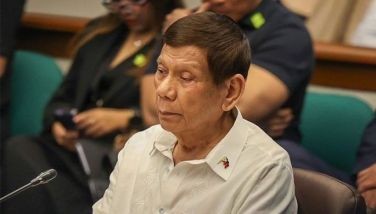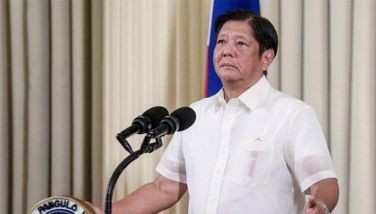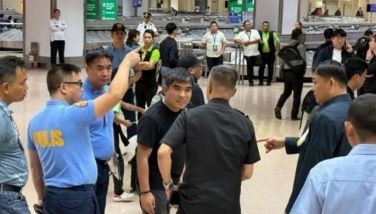Another ‘third Congress’

Before he steps down as the chairman of the Senate Blue Ribbon Committee, Senator Francis “Tol” Tolentino is seeking to institute internal reforms, especially in the conduct of its public hearings. A lawyer by profession, Tolentino underscored the need to reform these internal rules of the entire Senate to ensure “due process of law” is not just heeded but strictly followed in their public hearings and “inquiry in aid of legislation.”
Speaking in our weekly Kapihan sa Manila Bay news forum last Wednesday, Tolentino hopes the next Senate Blue Ribbon Committee chairman who will be elected to replace him will commit to the same reforms. The Blue Ribbon Committee has been traditionally headed by lawyers. Tolentino believes even non-lawyers can handle this Committee specifically tasked to handle allegations and complaints related to public accountability of all government officials and other State workers.
In moving to reform the Senate rules on public hearings, Tolentino specifically cited a recent Supreme Court (SC) ruling that found the Senate Blue Ribbon Committee had committed grave abuse of discretion on the contempt and the arrest of Lincoln Ong and Michael Yang Hong Ming, top executives of the Pharmally Pharmaceutical Corp. The two were subsequently sent to Pasay City Jail at the height of the Senate investigation on the alleged anomalies that went into the multi-billion peso worth of medical supplies procured by the government from their company during the COVID-19 pandemic in 2020.
It was chaired then by former Sen. Richard Gordon. However, Gordon’s Committee Report on the Pharmally case was the basis of the graft and corruption cases filed by the Office of the Ombudsman against the same company officials. The Ombudsman found a number of government officials during the previous administration as liable for the alleged irregularities in the Pharmally deal.
Tolentino acknowledged the validity of the SC ruling that upheld the petitioners’ right of due process even in legislative hearings. For this purpose, Tolentino has filed Resolution 889 seeking to allow any individuals being investigated or serving as resource persons or witnesses during Senate investigation to invoke one’s right to defend himself or herself from being cited in contempt before being placed under Senate custody for detention.
The Tolentino Resolution provides: “No witness appearing before the committee shall be cited in contempt for testifying falsely or evasively without being given the opportunity to be heard. The chairman, with the concurrence of at least one member of the committee, upon preliminary assessment based on pieces of evidence presented and submitted, be it documentary or testimonial, that the witness before is giving false or evasive testimony.”
To this end, he is seeking to amend Sections 16 and 18 of Resolution 5 which is known as the “Rules of Procedure Governing inquiries in Aid of Legislation.” Once approved by the Senate, it will cover “all persons under investigation/witnesses appearing in or whose rights are affected by such inquiry may submit a legal brief/memorandum summarizing his or her position relative to the subject matter of the inquiry within a non-extendible period of 15 calendar days from the adjournment of said inquiry.”
In another facet of the lawmaking process, Tolentino noted with concern a seemingly innocuous provision in many Congress-approved laws through these years has become a permanent feature in many of our Philippine statutes. This specific provision requires the crafting of the implementing rules and regulations (IRR). As standard phrasing of this provision, the IRR requires most often than not a 90-day period within which the Executive Branch is mandated to come out with the IRR for the enforcement of the law.
During our Kapihan sa Manila Bay news forum, Tolentino revealed having initiated another move to stop a practice that he bewailed has tolerated the IRRs drafted by the Executive Branch that cherry pick what to implement or not, and worst, add new provisions that were not provided for in these laws.
“Usually the IRR causes trouble. They (officials in the Executive Branch) change the spirit of the law,” Tolentino fumed.
Tolentino vows to identify the Undersecretaries and Directors in a privilege speech he will deliver next month to answer for what they did in the IRRs of certain laws they approved in Congress. Both chambers of the 19th Congress will resume sessions on January 22 next year.
Tolentino disclosed he inserted a “self-executory” amendment in the proposed Anti-Agricultural Economic Sabotage Act under Senate Bill No. 2432 that was approved on third and final reading by the Senators before they adjourned for the Christmas break.
“I have institutionalized it. It will be adopted by all (of the Senate committees),” Tolentino cited.
“For the first time, we have a bill which contains in its final section, on the effectivity date, ‘this law shall become effective 15 days after its publication in the Official Gazette or in a newspaper of general circulation, without the need for the issuance of implementing rules and regulations,” Tolentino announced.
The application of this “self-executory” provision of the law will be prospective in application but could serve as a “template” for the future bills that they in Congress will pass upon, Tolentino promised.
“With this provision, we now fortify powers of Congress – House of Representatives and the Senate,” he quipped.
And these IRRs were done by un-elected government officials, he bewailed. Certainly, Tolentino asserted, such acts were tantamount to usurpation of legislative powers in violation of the Constitution on the separation of powers of Congress, the Judiciary and the Executive Branch.
Tolentino vowed to stop this IRR practice going on for several decades. This, to him, is like having a “third Congress” that practically changes the letter and intent of the legislation that was already approved by the Senate and the House of Representatives and signed into law by the sitting President of the Republic.
- Latest
- Trending



























